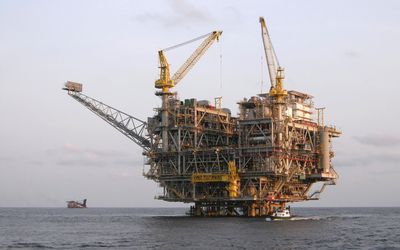Angola’s crude output tied up to pay for big loans
by Libby George,
2016-03-15 05:52:10.0
LONDON — Angola has found itself with a dwindling amount of crude to sell as more of its oil flows to China for debt repayment, leaving little revenue for anything from oil-sector development to healthcare in one of Africa’s largest oil-exporting nations.
Following a trend also seen in Iraq, Kazakhstan, Russia and Venezuela, Angola has tied up more of its output in pre-financed deals to bridge a drop in income due to the 70% fall in oil prices in the past 18 months.
The price slump means the western oil majors that manage the fields and platforms that help Angola export 1.8-million barrels per day are also taking more oil in return for their investment and services.
Countries with oil often use it as collateral for loans, and during a previous oil price collapse in 2008, the process helped to tide many over until better times. But this time, most experts say the rout will continue until at least next year.
As recently as five years ago, slightly more than half of Angola’s 50 to 60 monthly cargoes went towards paying oil majors, with as few as four to five cargoes going to pay back prefinanced deals, leaving the country’s state oil company Sonangol with as many as two dozen to sell on the market or to term buyers with ongoing contracts.
Through a series of conversations with at least six oil traders, Reuters found the number had been cut by more than half, to fewer than 10.
Part of that was because more has been going to western oil majors such as Total, Chevron and BP due to the price fall.
No one foresaw the price collapse when the contracts were written, said Readul Islam, an analyst with Rystad Energy. "There were no clauses in the contract about what happens to the profit sharing when prices dropped so low."
But another drain on Angola’s oil was a fresh round of pre-financing from China that more than doubled the number of cargoes sailing east as repayment from February.
The deal, struck with China’s state-run Sinochem Group in December, involved as many as six cargoes per month, on top of three to five already earmarked for fellow Chinese firm Unipec.
The deals with China by the MPLA, which has ruled the country for almost four decades financed infrastructure and also, helped secure an important new outlet to make up for declining US demand due to the shale revolution.
The December agreement was shrouded in secrecy, but traders said it involved at least $5bn in advance financing to be repaid with oil.
Roderick Bruce, principal energy analyst for West Africa with IHS, said in principle the lower the oil price, the more crude it costs to service debt.
"That’s an increasing amount of crude that can’t be sold to directly fill government coffers," Mr Bruce said.
Existing contracts meant Angola had only one cargo to sell on the spot market in February, traders said, crimping its ability to generate cash when needed and its ability to set prices for its term buyers.
A source close to Sonangol said it still had some flexibility to sell oil directly on the market.
It could get other loans, or refinance deals to limit the amount of crude paid to lenders, the source said, and had already dropped some contracts with term buyers who had not pre-financed them.
Reuters

An offshore oil platform near Angola. Picture: THINKSTOCK
LONDON — Angola has found itself with a dwindling amount of crude to sell as more of its oil flows to China for debt repayment, leaving little revenue for anything from oil-sector development to healthcare in one of Africa’s largest oil-exporting nations.
Following a trend also seen in Iraq, Kazakhstan, Russia and Venezuela, Angola has tied up more of its output in pre-financed deals to bridge a drop in income due to the 70% fall in oil prices in the past 18 months.
The price slump means the western oil majors that manage the fields and platforms that help Angola export 1.8-million barrels per day are also taking more oil in return for their investment and services.
Countries with oil often use it as collateral for loans, and during a previous oil price collapse in 2008, the process helped to tide many over until better times. But this time, most experts say the rout will continue until at least next year.
As recently as five years ago, slightly more than half of Angola’s 50 to 60 monthly cargoes went towards paying oil majors, with as few as four to five cargoes going to pay back prefinanced deals, leaving the country’s state oil company Sonangol with as many as two dozen to sell on the market or to term buyers with ongoing contracts.
Through a series of conversations with at least six oil traders, Reuters found the number had been cut by more than half, to fewer than 10.
Part of that was because more has been going to western oil majors such as Total, Chevron and BP due to the price fall.
No one foresaw the price collapse when the contracts were written, said Readul Islam, an analyst with Rystad Energy. "There were no clauses in the contract about what happens to the profit sharing when prices dropped so low."
But another drain on Angola’s oil was a fresh round of pre-financing from China that more than doubled the number of cargoes sailing east as repayment from February.
The deal, struck with China’s state-run Sinochem Group in December, involved as many as six cargoes per month, on top of three to five already earmarked for fellow Chinese firm Unipec.
The deals with China by the MPLA, which has ruled the country for almost four decades financed infrastructure and also, helped secure an important new outlet to make up for declining US demand due to the shale revolution.
The December agreement was shrouded in secrecy, but traders said it involved at least $5bn in advance financing to be repaid with oil.
Roderick Bruce, principal energy analyst for West Africa with IHS, said in principle the lower the oil price, the more crude it costs to service debt.
"That’s an increasing amount of crude that can’t be sold to directly fill government coffers," Mr Bruce said.
Existing contracts meant Angola had only one cargo to sell on the spot market in February, traders said, crimping its ability to generate cash when needed and its ability to set prices for its term buyers.
A source close to Sonangol said it still had some flexibility to sell oil directly on the market.
It could get other loans, or refinance deals to limit the amount of crude paid to lenders, the source said, and had already dropped some contracts with term buyers who had not pre-financed them.
Reuters





















Change: 0.83%
Change: 0.93%
Change: 0.95%
Change: 0.73%
Change: 1.91%
Data supplied by Profile Data
Change: 0.58%
Change: 0.43%
Change: 0.83%
Change: 0.00%
Change: 0.56%
Data supplied by Profile Data
Change: 0.01%
Change: -0.05%
Change: 0.03%
Change: -0.07%
Change: -0.24%
Data supplied by Profile Data
Change: -0.22%
Change: -0.10%
Change: -0.19%
Change: -0.17%
Change: 0.17%
Data supplied by Profile Data